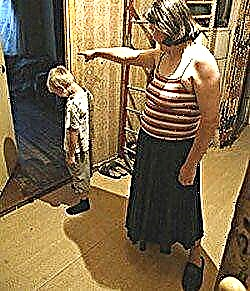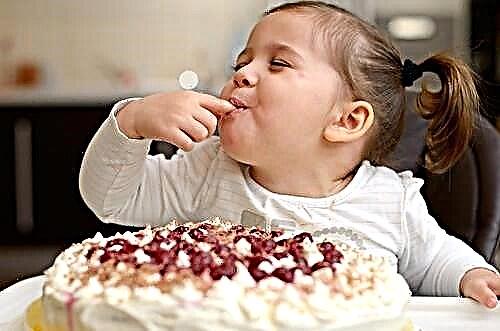What is the right way to punish a child for disobedience? Constructive ways of punishing children and adolescents. Is Physical Punishment of a Child Acceptable?
As much as parents love their children, sometimes they have to resort to punishment. After all, by indulging a child, you run the risk of raising an irresponsible teenager who will believe that everything is permissible for him. The main thing is not to go too far and not harm the child's psyche. How to punish a child constructively?

10 rules for parents
- Be consistent. Apply the same discipline to your child when he misbehaves. You should not arbitrarily change the rules of conduct or punishment without a clear reason. Do not ignore the misconduct of children, even if you find it difficult to do something about them.
- Establish clear boundaries. Give your child an idea of how to behave and how not, from a very early age, by establishing clear boundaries of what is allowed.
- Match punishment with wrongdoing. Little pranks or first-time misconduct deserve only a warning, but deliberate disrespect or aggressive behavior will require a serious reaction. Keep in mind that children are not perfect and learn from mistakes, but they must understand that their bad behavior is not acceptable.
- Don't punish for long. The child will lose the connection between the misconduct and the ban on television if it lasts for two weeks. The punishment should be short but effective.
- Keep calm. If you are constantly angry and raise your voice at children so often that it has become commonplace, your anger will no longer act on them. It turns out that you will need to scream even louder for them to notice you.
- Show a united front with your spouse. Agree with your husband / wife on general rules of conduct and punishment for children. The child quickly realizes that one of the parents can forgive him, and begins to manipulate him. Lack of consent can cause problems not only with your offspring, but also in your relationship with your spouse.
- Be a positive role model. Never forget that children learn by looking at you. Make an effort to be polite, hardworking, honest, and there may be fewer reasons for punishment.
- Remember to reward good behavior. Disciplinary action is only part of the educational process. In addition to punishing misconduct, take the time to reward good behavior such as kindness, patience, neatness, and hard work.
- Share your expectations. It is important that the child knows what you consider to be good and bad behavior, and understands the consequences of breaking the rules. If he is old enough, he can choose the reward for good behavior himself, if appropriate.
- Consider the age and temperament of the child. No two children are exactly alike. Therefore, one and the same disciplinary methods cannot be influenced by a three-year-old and seven-year-old child. If you have a little melancholic growing up, threats can harm his psychological health.
Constructive and loyal punishment
- Deprivation of the pleasant. If your child gets a bad grade for not doing their homework, you can restrict access to video games on weekends. It is important to take away privileges, not basic needs. Being deprived of television or meeting friends is one thing, but being deprived of sleep or refusing to feed is already abuse.
- "Correctional labor". Adults pay for violation of the rules with fines or community service. Why don't you transfer this practice to your child? If he deliberately draws on the table, let him wash it. Just don't overdo it. Ideally, work should be perceived as a blessing, and not as a punishment.
-
 Timeout (break). The child is asked to sit in a separate room or on an armchair in a quiet corner and reflect on his or her wrongdoing. Try to find a place where there is no TV, toys, or computer. You can not lock him in a dark room, so as not to harm the psyche. The amount of time spent in the timeout depends on the severity of the "offense" and the age of the child. General rule of thumb is about one minute every year.
Timeout (break). The child is asked to sit in a separate room or on an armchair in a quiet corner and reflect on his or her wrongdoing. Try to find a place where there is no TV, toys, or computer. You can not lock him in a dark room, so as not to harm the psyche. The amount of time spent in the timeout depends on the severity of the "offense" and the age of the child. General rule of thumb is about one minute every year. - Personal apology. Asking forgiveness from someone he offended is not just a constructive punishment for a child, but also preparation for adulthood. If your child has cut flowers in a neighbor's flower bed, make him apologize. For extra effect, have your child help tidy up the flower bed on Saturday.
- Ignoring. Children often indulge in order to get the attention of adults. You should not give in to provocation. Explain to your child that if he continues to be mischievous, then you will not talk to him. In the event of a prolonged hysteria, you can leave the nursery, ceasing to communicate with the baby until the end of the scandal. Be careful, as long-term deprivation of parental love turns into torture. We also read: how to react to a child's whims
- Verification by personal experience. Let your child be convinced of the validity of your requirements first-hand. I ran through the puddles - as a result, a squelching nose and bed rest. But you should know the measure with the consequences of negative actions so that the child does not harm himself.
- "Temporary arrest". If a teenager has committed a serious offense, you can limit his communication with friends: not let him go to a birthday or a party. You cannot apply this type of constructive punishment all the time, since in adolescence, friendly relations with peers are very important.
- Fairy tale instead of punishment. To master the rules of behavior, read fairy tales to your child that will allow him to understand and feel that others have such experiences and problems. Through fabulous images, children are offered ways out of difficult situations, ways of resolving conflicts. At the end of each story, the hero (and therefore the child) understands that this is no longer possible. We read the article: influence of fairy tales on the development of children
Is physical punishment permissible?
 Perhaps no other topic in matters of raising a child causes such a heated discussion as physical punishment. Many teachers and psychologists unanimously oppose him, believing that whipping only gives rise to fear and resentment in the child in the child. To avoid slapping and smacking, children become dodgy and learn to lie.
Perhaps no other topic in matters of raising a child causes such a heated discussion as physical punishment. Many teachers and psychologists unanimously oppose him, believing that whipping only gives rise to fear and resentment in the child in the child. To avoid slapping and smacking, children become dodgy and learn to lie.
True, one should distinguish between the systematic beating of children with an officer's belt with a buckle and the reaction of adults to the child's dangerous behavior. Surely you could see how a terrified mother spanks her baby to death, who ran out onto a busy highway and almost fell under the wheels of a car. In such extreme cases, physical impact usually does not harm the child, as it does not carry humiliation.
How to punish children is up to their parents to decide. The main thing is to do it correctly and constructively. Do not go too far with disciplinary actions, it is better to explain to the child, without screaming and physical punishment, why he behaved incorrectly, and then he will understand you.
- Why you can't beat a child - the consequences of physical punishment of children
- 7 big mistakes parents make when fighting with their kids
- How you can't punish a child
- Do I need to punish a child at 3 years old: the opinion of parents and a psychologist

 Timeout (break). The child is asked to sit in a separate room or on an armchair in a quiet corner and reflect on his or her wrongdoing. Try to find a place where there is no TV, toys, or computer. You can not lock him in a dark room, so as not to harm the psyche. The amount of time spent in the timeout depends on the severity of the "offense" and the age of the child. General rule of thumb is about one minute every year.
Timeout (break). The child is asked to sit in a separate room or on an armchair in a quiet corner and reflect on his or her wrongdoing. Try to find a place where there is no TV, toys, or computer. You can not lock him in a dark room, so as not to harm the psyche. The amount of time spent in the timeout depends on the severity of the "offense" and the age of the child. General rule of thumb is about one minute every year.

